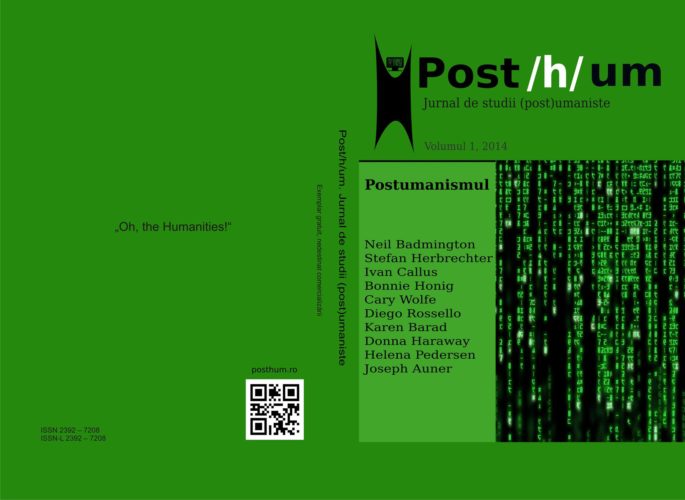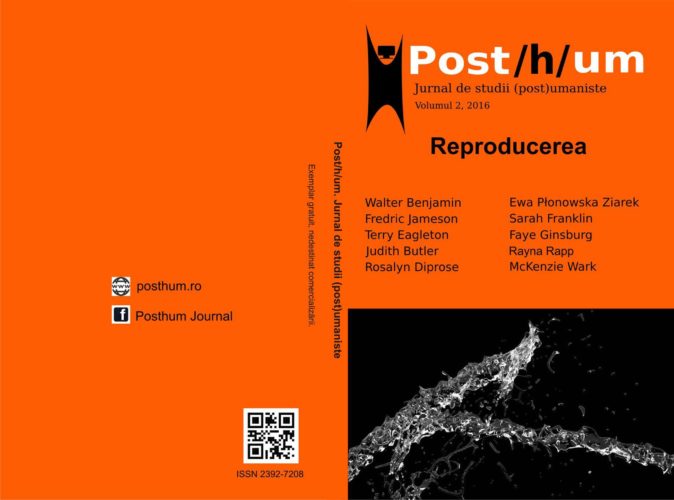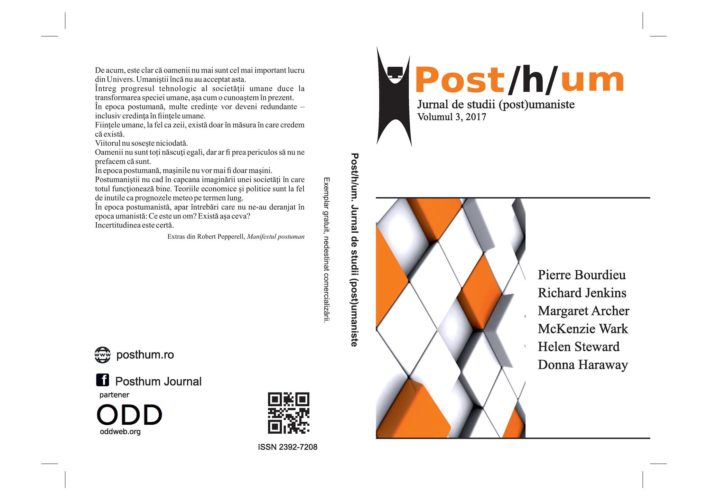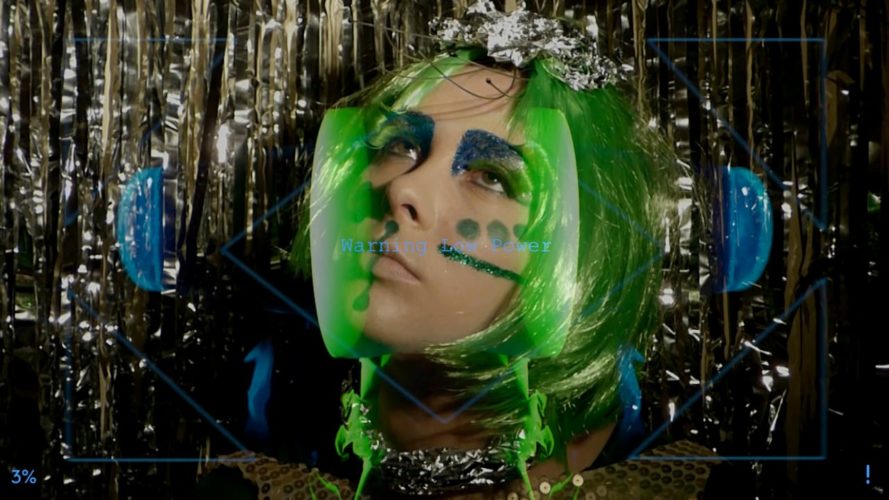Post/h/um. Journal of (Post)humanist Studies launched in 2014 as an independent open access publication that translates and forwards contemporary critical theory. The journal concerned itself with the teeming of man-environment, man-technology, man-other creatures which gave birth to new paradigms such as posthumanism, transhumanism, anti-umanism, animal studies, the Anthropocene etc. On the 21st of April, they have launched their third number at Hecate bookstore with first time translations from McKenzie Wark as well as Helen Steward, Richard Jenkins, Margaret Archer and Donna Haraway.
We had a relaxed, lightweight conversation on mankind’s posthuman future and the post-apocalypse with Vasile Mihalache, cofounder and translator for Post/h/hum. Although the prefix ‘post’ might be a bit prematurely and hastily attached to all things going on today to concede an aura of post-maturation, we have decided to go outside this sphere of hyper-impressionistic reasoning and carry on a dialogue around the borders of some founding texts of poshumanism, many of which had been already translated in the previous numbers of the magazine.
What was the deciding moment to set off this project and what were the reasons why you decided to continue with it?
The idea came to us in 2011 and it has had a dose of luck at its foundation, like all projects do. Me and Sînziana Cotoară followed a Ph.D. course at Leiden University while Daniel Clinci was in Amsterdam. It was a bit weird since it has proved rather difficult to establish some contact with lecturers there and ask them to accept us as project coordinators during our stay. In the end some of them showed to be very open minded, although initially we were regarded with suspicion as, generally speaking, bibliographies from here did not comprised those texts that we have later translated. We realized we would want to bring back with us a dozen of articles that we had downloaded from there. The idea arouse from the fact that we wanted to do this legally, without doing piracy, even if none of us is keen on the idea of intellectual property rights. Translating them would have posed as a much easier task as most of the authors are still alive and so it is possible to contact them straight away. We have decided to do this as a political act. We might as well just published the articles in original, as they were, on a blog or website or something like that- but we wanted to create a connection with their authors.
We spoke countless times by email, for example, with Donna Haraway who was very open about it while Terry Eagleton has sent us a hand written letter- he does not own an email address. We thought that it would be important to let them know what’s been going on is Romania. Some were very open – Bonnie Honig included us in her CV by her list of publications column. I believe they enjoyed a bit the part that someone from the periphery took interest in their work. Because, let’s be honest, not even in the west are they occupying the front stage in academia. We have persisted in this project following each and every one’s personal impetus. Put very plainly we did not want to lose our own minds. We wanted to continue to operate in this field after we are done with our Ph.D.s (none of us got the chance to stay in the academia or do research although we did keep close to this world – Daniel teaches English at the Faculty of Medicine in Constanța, while me and Sînziana work in the editorial sector) so we set ourselves to create a dialogue framework. In the first place, we’ve done this for ourselves, and then for everyone interested in these topics that find themselves somewhat outside the university. In there, the openness towards these topics is found to be rather low.
As you yourselves confess, the Romanian academia displays considerable lacks in assimilating these new movements- further than, say, the private stakes of some enthusiasts. How do you explain the fact that the first Romanian magazine devoted to these topics does not emanate from a university set but rather from a private initiative which is self- funded and outside the academic system?
I was just saying to you how Post/h/um launched itself also as in a way to compensate, the lack of access to digital libraries of some universities in Romania, a lack much larger back then in 2011 when we decided to put our shoulder to the wheel with this project. A lack that still persists today. Then we wished to attest the fact that these people really do exist, that we are engaging with them and their editors while legally translating their articles. Rather than just randomly translating a bunch of texts we wanted bring these articles under numbers devoted to one topic, such it has been the case with our first, second and fourth numbers: Posthumanism, Reproduction and The Child.
I believe the explanations for which a university does not occupy itself with this sort of job needs to be provided by the university. Many lecturers did pick up an interest shortly after we’ve launched the magazine but only to see whether or not we are indexed in databases and this way they could score credits when they would eventually submit for us. For now, we don’t publish Romanian articles, we’ve only got a one written by Daniela Petroșel which was hosted on our website but not included in any of our editions. To be fair the level of articles on critical theory in Romania is not very advanced and, if we were to publish them, we would have to do many compromises. I believe it is more important to read and translate in order to develop a specialized vocabulary in Romanian and, implicitly, a line of thought. I know it sounds antiquated as a quarrel from 1848 but in this case it is still valid: there are many terms and concepts used even in literary criticism that have nothing to do with their original variant. Doubtlessly everyone is free to use them in any way they want to…. the danger in this, though, is to create a breech for imposture. We also wanted to advance a language that needs to ground future Romanian research, a short history in translation of certain cultural events about which universities in Romania do not want to engage with for reasons that belong to them.
Which are the main difficulties you have been confronted with so far, apart from the financial ones, the latter being apparent for an open-access publication?
However peculiar, we did not encounter proper financial difficulties, since, as I was saying, we did this thing alone, without financial investments apart from the site fee which was a scrap and now is hosted by Cristina Bogdan and ODD. We would like to thank her in this way. Time is money therefore the biggest investment was our time. It was nowhere close to being easy as each of us has a full time job which means that we can only take care of translating and promotion in the sparse free time that remains.
We should have more contributors. So far only us three, the founders, have done translations. Another initial difficulty lied in convincing the authors that we are of good faith- but that happened soon after we’ve published our first number, then with the second one it was easier for us, people stopped being cautious about it. They understood that we are not in this to make money, so we have no money to give away- that would be an idea of gift economy.
I return to our political options, which are very important to us, as important as the texts we choose to publish. It’s about a gift economy more than a market economy and we would never want to have to renounce it. Also, if we would like, although it might sound odd, for a critical theory magazine about posthumanism to address a larger audience. This remains one of our wishes. Besides, in these three years the public has grown, and the concept of posthumanism has already percolated/permeate the lexicon of literary and cultural criticism- even if the term seems to be taken for something else in there. This fact has brought us new readers and still does.
In the first number of the magazine, Posthumanism, you have included theoreticians like Donna Haraway, Cary Wolfe, Neil Badmington etc who try to explain what the outrunning of Humanism, the Enlightenment and the idea of an autonomous, coherent, liberal subject would bring. For many, the notion of posthumanism brings with it apocalyptic anxieties. On one side, it is perceived as an impossibility, even by some authors you’ve been translating in the sense that we have never manage to think ourselves or of ourselves outside our human limitations. That is why I have brought with me Timothy Morton’s essay in which he states that we should always be warily not to profess a form of narcissism. If you think about it, from one angle, ideological terms like human uniqueness and dignity- pivotal for institutions like the declaration of human rights or organizations like Amnesty- are dependent on progressive anthropocentrism advanced since the early days of modernity. To ease down any uncomfortable feeling in the vicinity of the posthuman idea, how would you think an ethics of poshumanism would look like considering what you have been translated and published thus far?
I would like to ease their concerns, but, like you correctly assumed there is nothing to be afraid of. We have put on the cover of the 3rd number a quote from The Posthuman Manifesto of Robert Peperell which sounds something like this: “People are not born equal but it would be dangerous not to pretend that they are”. I believe in this too….it’s clear that us people are neither born nor die equal: it’s one thing to be born in war torn Siria and another thing to be born in Copenhagen. This is a self-explanatory example. That all people should be born equal- well that’s a different story. If not for all posthumanists, then at least for myself, describing the world is more important than normalizing it. I trust that if we manage to describe the world it is much easier to avoid the trap Timothy Morton was talking about. As in we would be trying to enunciate about the other and not about how the other should be. Certainly there is an underlying narcissism in this act too, but I still think it is easier for it to be exceeded this way. Actually this would constitute the gravest humanist error: taking what it is supposed to be happening for what it is happening. A theological error, at its core, that has been adopted by humanism and continued from Enlightenment up to our days. This continues to create many methodological and political deadlocks. Humanism has the tendency to ignore other species from this equation of ‘having’ or ‘not having’ rights. I believe Timothy Morton actually recounts on the fact that nature has never been ‘natural’ and that the naturalization of nature is still a result of humanism just like the ‘culturalization’ of culture. I think we’ve managed to overturn these ideas since at least two generations of thinkers.
It is very real that human rights are not a ‘natural’ given but a cultural construction and it is precisely for this reason that they are so easy to ignore and annul. Human rights are, a necessary illusion but a mere illusion in the end. To make myself clearer and not to be taken as someone opposing human rights: they were and still are one of the major historical achievements but their reign is about to finish and we should better prepare ourselves for that. In what concerns the apocalypse, it’s like in Derrida’s say: it has already happened therefore it will arrive no longer. Like you’ve said, we cannot think of ourselves outside human limitations however, concepts such as autonomy, subjectivity, agency are already shaking. A solution to this would be to rethink the notion of man or whatever we would wish to call ourselves. What we take for human boundaries our our capital mark Humanity are no more than the product of a set of relationships between abiotic and biotic components like bacteria, technology and non-human species.
I refrain myself to talk about [posthumanist] ethics even if I am aware of the whole hype surrounding the topic. To me the whole thing makes me a bit uneasy for the reason that I am not a philosopher and I do not think in philosophical terms. It could also be that ethics for me is a humanist product which grounds itself on an imperative- be it strong or weak- and I do not really know what sort of ethics could we impose to a cyborg. It might be that the way in which we are built is less and less related to our own desires and more to technology and other species. However there are plenty minds out there to concern themselves with such issues. In the article we’ve published in our third number Donna Haraway pointed out some interesting things: the necessity of a deep inbreeding between Homo Sapiens and other critters, the necessity of places of refuge against the disasters caused by men… That would constitute a starting point for a posthumanist ethics.
I return now to the Romanian context where humanism and universalism ( to which one has to include the programmatic self-colonization of Romanian culture ) are widely accepted and applied as curricular material and institutional practice. Within a wider context, Rosi Braidotti was mentioning the triumph of a conservative republicanism in French universities. While French academia has produced major figures for the counterculture and critical avantgarde such as Derrida, Deleuze or Foucault she complained that the universities failed to interiorize even a scrap of their resistance discourse. Structurally speaking, the university remained inflexible to radical transformations ( unlike 68-70s anti-universities). It has remained hierarchical, elitist, subservient to the state and, more recently, to the market. What posthumanist values you think a university could adhere to? And how could it transform itself through them from a utopian fortress towards an organization that addresses the urgencies of the contemporary world?
Like the whole educational system, the university compensates the state’s needs. It is form of state controlled organization serving the interest of the state. One does not summon posthumanism to understand that: marxists before have convincingly proven this even before May 68. Even the state is questioned as a valid form of organizing society. These things happen more often in the West and less in our country. There capital has already taken over the role of the state as university’s custodian.
We were mentioning narcissism and whether a complete stepping out of it is still possible or is this just another extreme, exuberant form of narcissism. How would this exit speak to the condition of the artist- if I can still utilize this phrase without irony- a condition still dependent on narcissism. to a certain extent. To contextualize this a bit, it’s been a while since artist and curators are crediting ideas and practices of philosophical discourses. In a performance of CUNTemporary group, ASMR Femme Alien Fixes You by Lizzie Masterton the spectator was temporarily transformed into an altered, wounded object. (S)he would have had to wear headsets in front of a screen where a female-alien was trying to establish a feeling of mutual empathy. Also the performance was debating notions such as subjectivity and privacy from a posthumanist perspective. How do you relate to these ideas?
Yes I’ve watched the performance…it’s interesting if achieved with modest or odd means of production. It stresses out this notion of man as a wounded thing or creature….creature I would say as the voice was addressing a human being.
Yes, they’ve been using a human voice…
It sounds to me more like a man than a cyborg, like a World World II nurse that tries to soothe you with her voice….
Or that of an alien….
A very humanized alien. It was also introducing this idea of alien as technology or technology as an alien- as a source of wellbeing- in the sense that it was restoring somehow a sense of humanity. Among other things the paternalistic care that the alien has towards man struck me. Man in pain, man suffering, man turned into an animal. Rather than being transformed into an object that seeks restoration- as objects do not need restorations, and certainly not linguistic restorations- the voice created a reversal of roles the participants were playing: a technology turning into a human and a man becoming tech through the mediating participation of aliens. As if we were their inferior kindred in need of help. What lacked from the performance was the fact that technology often means exploitation and this points towards a rift between posthumanism and transhumanism. Posthumanism possesses a critical outlook on technological development. The performance inclines more towards transhumanism as aliens were conceived as tech inborn, displaying an impulse to take care of people, to restore them. This I find rather hard to believe.
I have found interesting this perspective on care- of which I believe Derrida wrote a couple of lines towards the end of his life. On the other hand, leaving aside these humanist fears that aliens would want to colonize us…to fix us….
Yes, maybe for them the separation superior- inferior makes no sense…
It might hurt us more if we were indifferent to them if they would consider us irrelevant/ …it would hurt us in our narcissism. We would rather prefer the ultimate apocalypse than being considered wholly neglectable.
Sticking back to the performance, language to me acts as an obstacle in considering myself a wounded object…since I automatically become a subject after I’m addressed through language. But you’re right, it does make you feel subjected to some external powers, just like an object would…
The interview was conducted live in May 2017.
POSTED BY
Georgiana Cojocaru
Georgiana Cojocaru is an art writer, curator and editor living and working in Bucharest. At the moment, her research practice focuses on generic aesthetics, poetry in the Anthropocene and fictionalisa...





Comments are closed here.